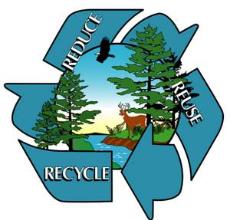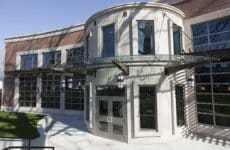By: Christina Borger
Posted In: News

Photo credit: Kristen Tomaiolo
Salve Regina’s efforts to go ‘green’ is making great strides as their advisory group kicks off their environmental campaign by turning their handwritten plans into actions bringing closer their hopes of a more sustainable future.
Assistant professor of Biology and Biomedical Science, Dr. Jameson Chace, continues to make efforts to delve into the primitive step for this long term project, analyzing each department’s daily actions and suggesting more sustainable revisions. Chase said, “This is a slow moving project, but baby steps are being taken to move the project along. Some of the biggest efforts are coming from Sodexho so far.” Sodexho dining services has made some of the largest strides towards sustainability. Vice President of Administration and Chief Financial Officer, William Hall reports that Sodexho purchases locally grown and organic products in order to save in transportation costs, both ecological and economical. Though buying local products may cost more financially, the benefits of supporting the local merchants and the bounty they produce outweigh the value of the dollar. Hall stated that Sodexho is Salve Regina’s biggest contractor on campus, who is responsible for providing dining services to all on-campus venues like Miley Café, Sky Ranch Grill, Global Café, Jazzman’s Café and even Miley Mart, the campus convenience store. The Director of Sodexho Dining Services, David Miller commented on some of his department’s green efforts. Miller said, “A sustainability specialist, who is part of a sustainability group, visited campus at the beginning of this academic year. They are a support system for the management team, who helps to meet the needs of each individual campus.” He explained how the specialist provides a program geared towards the level of greenness of each school. Presently, Sodexho purchases a variety of different locally-grown products, mainly produce such as potatoes and apples. Farmers must be within 200 miles in order for them to be considered local to Salve’s campus. “This year’s annual Thanksgiving at Miley Hall used many locally grown products. The turkey came from a sustainable farm in Vermont and was delivered in a bio-diesel powered vehicle,” Miller said. He shared how the turkey was about 50% more expensive coming from Misty Knoll, a reputable sustainable farm in Vermont. “Though most aspects of the group’s goals might ultimately cost more and be more labor-intensive, the benefits that will become of this precede a better future,” Hall commented. Miller remarked, “We hope to see more communication in the dining hall and be more proactive by promoting local produce. Sodexho’s goal is to be legitimate in what we do, and doing what we do better. If we can’t get something local, then we will try to get it sustainable.” The most recent investment towards a more environmentally-friendly future was the Department of Safety and Security’s new hybrid vehicle. This was a preliminary plan just over a month ago. The university purchased a hybrid Ford Escape to replace their existing Escape. Hall commented, “Though the hybrid Escape costs more than the regular Escape, the savings in gas and emissions alone are enough to consider this a good investment.” The Director of Safety and Security and member of the advisory group, John Mixter, said, “There have been mixed results from schools that have already invested in a hybrid vehicle.” The new vehicle will arrive in the next two weeks. “However, depending on how it performs and the costs of maintaining and fueling it, maybe we will consider hybrid vehicles for facilities and possibly the campus shuttles,” Mixter added. Mixter highlighted how aside from driving around a security car, his officers also patrol campus on mountain bikes and by foot. By being out of the car, the officers can engage and interact with the students, which Mixter encourages. Mixter commented on how certain days and times require a patrol car over a bike or by foot. “Weekends, usually Thursday through Saturday, prove to be more active days and nights than the rest of the week.” “The department of security is more than willing to do their part by doing what they can without compromising anyone’s safety in order to secure a better environmental future,” assured Mixter. The Department of Safety and Security is not the only one trying to cut fuel costs and emissions by turning to alternate forms of transportation. Salve students are urged to take advantage of the RIPTA transportation program the university started in 2001. Salve was the first Rhode Island school to provide such program for their students. Under this program any member of the Salve community can ride any RIPTA transportation for free within Rhode Island, provided they show their Salve ID. Under this program, students can rely on public transportation instead of using their own personal vehicles to get around, which not only promotes protection of the environment, but safety of the students as well. The trolleys used are clean-air vehicles, which provide an “environmentally conscious method of meeting students’ on- and off-campus transportation needs,” per SALVEtoday. The university continues to promote the use of the recycle bins located both inside and outside of university buildings. More recycle bins have been issued to the student housing facilities. Receptacles have also been placed throughout the academic buildings, the McKillop Library, and Rodgers Recreation and Sullivan Fitness center. As the Salve community starts seeing more and more applications of environmentally protective measures, more of the community will step up to the plate to do their part. Saving our planet, Earth starts close to home. With the help and support of the community, Salve Regina University’s Environmental Advisory Group can accomplish more with the hopes that those who contribute will spread awareness beyond their front doors in the future.













